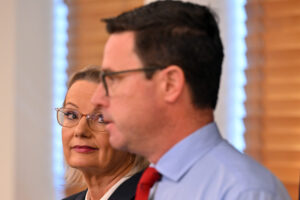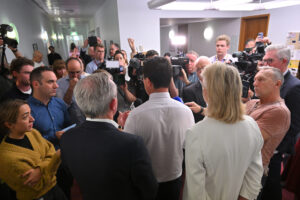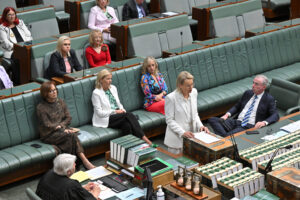by Richard Denniss
[This article originally appeared in the Australian Financial Review 18.09.18]
As the Wentworth byelection will show, the desire of Coalition MPs to micro-target their “base” is a terrible way to develop national policy or win federal elections. Take energy policy: should the Coalition compete with Pauline Hanson for the climate sceptic vote in Queensland seats like Dawson or should it compete with Kerryn Phelps for the sensible centre in Malcolm Turnbull’s old seat of Wentworth?
Eight months out from an election and six points behind in the polls, this question has landed in Scott Morrison’s lap. Little wonder he has decided to avoid the issue of climate policy altogether and focus instead on electricity prices.
Climate policy vulnerability
But you can’t hide from fights that your opponents are desperate to pick. So it should be of no surprise to Liberal strategists that all of the candidates hoping to snatch one of the safest Liberal seats in the country from Dave Sharma, the new Liberal candidate, are emphasising climate policy.
In recent times the Coalition has blamed renewable energy for everything from the profits of the big energy companies to unemployment, but it wasn’t that long ago that Malcolm Turnbull launched a report showing how Australia could rapidly transition to 100 per cent renewables. Of course, he isn’t the only Liberal to change his mind about climate policy. Tony Abbott has supported emissions trading, carbon taxes, direct action, and signed Australia up for Paris – and now wants to renege on his own commitment.
While the Coalition can’t seem to make up its minds up about renewables, voters have. The Australia Institute’s Climate of the Nation report recently found that 76 per cent of Australians rate solar in their top three preferred forms of energy and 68 per cent want governments to develop a plan to phase out coal-fired power stations. Only 20 per cent of Australian voters want to withdraw from our Paris obligations and just 3 per cent support subsidies for projects like the Adani coal railway.
Such national views seem to matter little to the Liberals, but in the age of micro-targeting, Sharma’s real problem is that electorate polling shows 60 per cent of Wentworth voters want to see deeper emission cuts while only 17 per cent want less ambition. It should be of no surprise that Kerryn Phelps, a former head of the Australian Medical Association, emphasised the scientific basis of the need to tackle climate change at her campaign launch.
Australian voters have always had diverse priorities, values and policy preferences and there is nothing new about the tension between the interests of voters in the cities, the suburbs and the bush. Of course these differences historically have been so great that the Liberals and Nationals operate as a coalition, rather than merge into a single cohesive party.
Targeting the base
But what has changed is the willingness of Coalition MPs to demand that, when developing national policy, the interests of the fan base of particular MPs should be given priority over evidence, expertise or broad public opinion. While there is nothing in the Australian constitution that prevents a political party from prioritising the views of a narrow subset of the community, there is nothing in the history books that suggests ignoring good policy development or good opinion polling is likely to deliver either good government or lasting government.
Developing good policy and good political strategy isn’t like a left-right Tinder swipe. While first impressions matter greatly in online dating, politics is the art of not just changing your mind, but changing the minds of others. There is no doubt that, in order to appeal to the voters of Wentworth, Sharma will emphasise his support for climate action.
But there is also no doubt that at the same time Barnaby Joyce, Peter Dutton and Craig Kelly will be just as keen to tell their fan base that they are not for turning in the war against the Renewable Energy Target and our Paris targets.
You can’t always blame individual MPs for pushing whatever agenda their polling or their Twitter feed tells them will win votes, but you can blame a Prime Minister for hiding from the hard decisions. Even if the voters of New England and Wentworth have disparate views on climate change, and the polls suggest they do not, it is up to the leader of a political party to come up with an overall policy position for their party.
The Twitter feeds of Sharma and Joyce may have little in common, but their electorates are connected to the same electricity grid.
Richard Denniss is chief economist at The Australia Institute @RDNS_TAI.
Between the Lines Newsletter
The biggest stories and the best analysis from the team at the Australia Institute, delivered to your inbox every fortnight.
You might also like
Gender parity closer after federal election but “sufficiently assertive” Liberal women are still outnumbered two to one
Now that the dust has settled on the 2025 federal election, what does it mean for the representation of women in Australian parliaments? In short, there has been a significant improvement at the national level. When we last wrote on this topic, the Australian Senate was majority female but only 40% of House of Representatives
Hearing voices: why the Nats should be watching their backs
The community independent movement did not begin in Sydney or Melbourne, but in the bush.
Liberal Party will miss its decade-long target for female representation
At the National Press Club today, Shadow Treasurer Angus Taylor was asked about how few women the Liberal Party is nominating as candidates.



